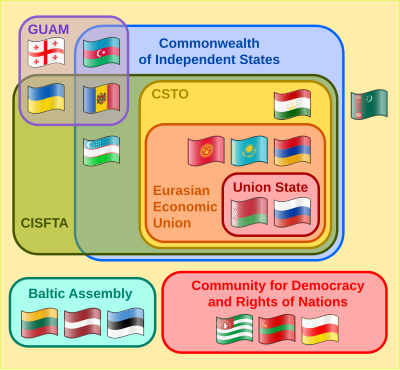Collective Security Treaty Organization
- CSTO is an intergovernmental military alliance that was signed on 15 May 1992.
- In 1992, six post-Soviet states belonging to the Commonwealth of Independent States—Russia, Armenia, Kazakhstan, Kyrgyzstan, Tajikistan, and Uzbekistan—signed the Collective Security Treaty
- This is also referred to as the “Tashkent Pact” or “Tashkent Treaty”.
- Three other post-Soviet states—Azerbaijan, Belarus, and Georgia—signed the next year and the treaty took effect in 1994.
- Five years later, six of the nine—all but Azerbaijan, Georgia, and Uzbekistan—agreed to renew the treaty for five more years, and in 2002 those six agreed to create the CSTO as a military alliance.
The CSTO charter reaffirmed the desire of all participating states to abstain from the use or threat of force. Signatories would not be able to join other military alliances or other groups of states, while aggression against one signatory would be perceived as an aggression against all. To this end, the CSTO holds yearly military command exercises for the CSTO nations to have an opportunity to improve inter-organization cooperation. A CSTO military exercise called “Rubezh 2008” was hosted in Armenia, where a combined total of 4,000 troops from all seven constituent CSTO member countries conducted operative, strategic and tactical training with an emphasis towards furthering efficiency of the collective security element of the CSTO partnership. The largest of such exercises was held in Southern Russia and central Asia in 2011, consisting of more than 10,000 troops and 70 combat aircraft. In order to deploy military bases of a third country in the territory of the CSTO member-states, it is necessary to obtain the official consent of all its members. It also employs a “rotating presidency” system in which the country leading the CSTO alternates every year.
Foundation

Euler diagram showing the relationships among various supranational organisations in the territory of the former Soviet Union
The CSTO grew out of the framework of the Commonwealth of Independent States, and first began as the CIS Collective Security Treaty (CST) which was signed on 15 May 1992, by Armenia, Kazakhstan, Kyrgyzstan, Russian Federation, Tajikistan and Uzbekistan, in the city of Tashkent. Azerbaijan signed the treaty on 24 September 1993, Georgia on 9 December 1993 and Belarus on 31 December 1993. The treaty came into effect on 20 April 1994.
The CSTO was set to last for a 5-year period unless extended. On 2 April 1999, only six members of the CST signed a protocol renewing the treaty for another five-year period – Azerbaijan, Georgia and Uzbekistan refused to sign and withdrew from the treaty instead. At the same time Uzbekistan joined the GUAM group, established in 1997 by Georgia, Ukraine, Azerbaijan, and Moldova, and largely seen as intending to counter Russian influence in the region
